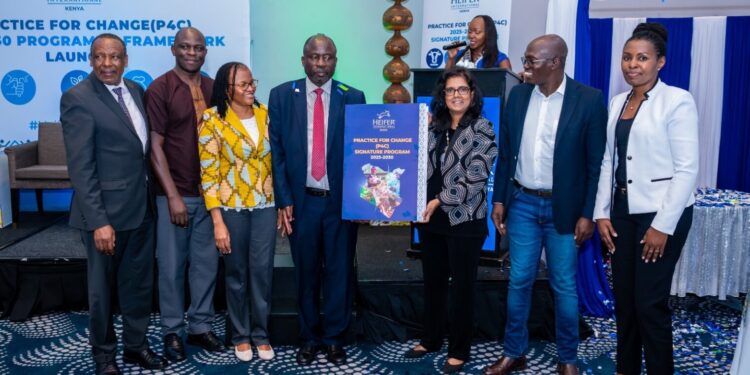The Government of Kenya has endorsed Heifer International’s groundbreaking Practice for Change (P4C) Signature Program, an ambitious Sh12.4 billion (USD 95.7 million) initiative aimed at empowering 625,000 smallholder farmers across 26 counties. Officially launched in Nairobi, the five-year program aligns strongly with President William Ruto’s Bottom-Up Economic Transformation Agenda (BETA), marking a critical milestone in the drive toward sustainable agricultural development in the country.
P4C is designed to modernize and restructure Kenya’s agriculture by focusing on climate-smart practices, enhancing productivity, and improving market access for farmers. Its central pillars include strengthening value chains in poultry, dairy, beef, and horticulture. According to the Ministry of Agriculture, this initiative responds directly to the national call for sustainable and inclusive economic empowerment, especially in arid and semi-arid lands (ASALs), which make up over 80 percent of Kenya’s landmass.
Speaking during the launch, Dr. Christopher Wanga, Director of Livestock Policy at the Ministry, emphasized that the program is not merely a development project but a strategic intervention for sector-wide reform. “This is more than a program launch—it’s a call to action for structural transformation of the agricultural sector,” Wanga noted, stressing the alignment with Vision 2030 and the government’s Livestock Master Plan, which aims to guide sustainable investment in Kenya’s livestock-rich regions.
Agriculture Cabinet Secretary Mutahi Kagwe, in a speech read on his behalf, applauded the timing and scale of the initiative. He reaffirmed that the Ministry is fully committed to implementing BETA and enhancing food security. Kagwe highlighted the program’s potential to create vibrant, climate-resilient, and commercial agricultural systems that support national economic goals and Kenya’s international commitments such as the Malabo Declaration.
Heifer International CEO Surita Sandosham reiterated that P4C is a collaborative, long-term undertaking meant to uplift smallholder farmers to a sustainable living income by 2030. “At its core, P4C is about creating opportunities that are locally driven, market-oriented, and sustainable,” she said, adding that the initiative prioritizes the inclusion of women and youth, who are often excluded from traditional agricultural value chains.
One of the unique features of the program is its systems-based approach to market development. This involves building farmer organizations, improving productivity, boosting profitability, and facilitating access to both domestic and international markets. The program will also capitalize on co-managed funds with donors and public institutions, ensuring a multi-stakeholder approach for maximum impact.
Heifer International Kenya Country Director, Clarice Bugo-Kionge, provided real-life evidence of the program’s efficacy, citing success stories such as in Nakuru County where livestock mortality rates have decreased and milk yields have doubled. “Through our cow to capital model, we’ve helped families move from subsistence farming to fully-fledged agribusinesses,” she said, noting the transformative potential of such models when scaled nationally.
P4C also supports technological innovation through the Agriculture, Youth, and Technology (AYuTe) initiative, which equips young innovators with the digital tools, mentorship, and funding necessary to modernize agriculture. The program will be further strengthened by the Power, Water, and Internet (PWI) initiative, enhancing access to essential services in remote farming communities and improving overall resilience.
Financial inclusion is another cornerstone of P4C. Through Heifer Impact Capital, the program aims to bridge critical financing gaps by supporting farmer-owned enterprises. This intervention will empower rural communities to reinvest in agriculture, expand operations, and drive local economic development, all in alignment with BETA’s pillar of inclusive growth.
In conclusion, the P4C Signature Program is not just a boost to Kenya’s agriculture—it is a robust endorsement of the government’s commitment to bottom-up economic empowerment. By integrating climate-smart innovations, strengthening value chains, and promoting inclusivity, the initiative perfectly aligns with President Ruto’s BETA framework and sets a precedent for how public-private partnerships can drive structural transformation and shared prosperity.










